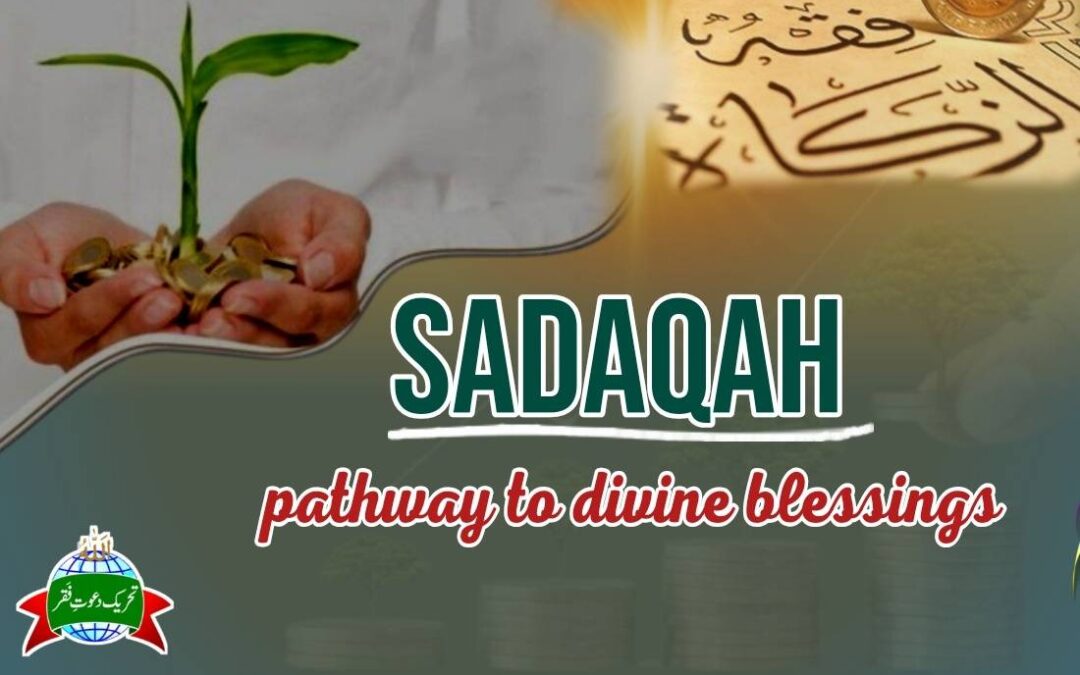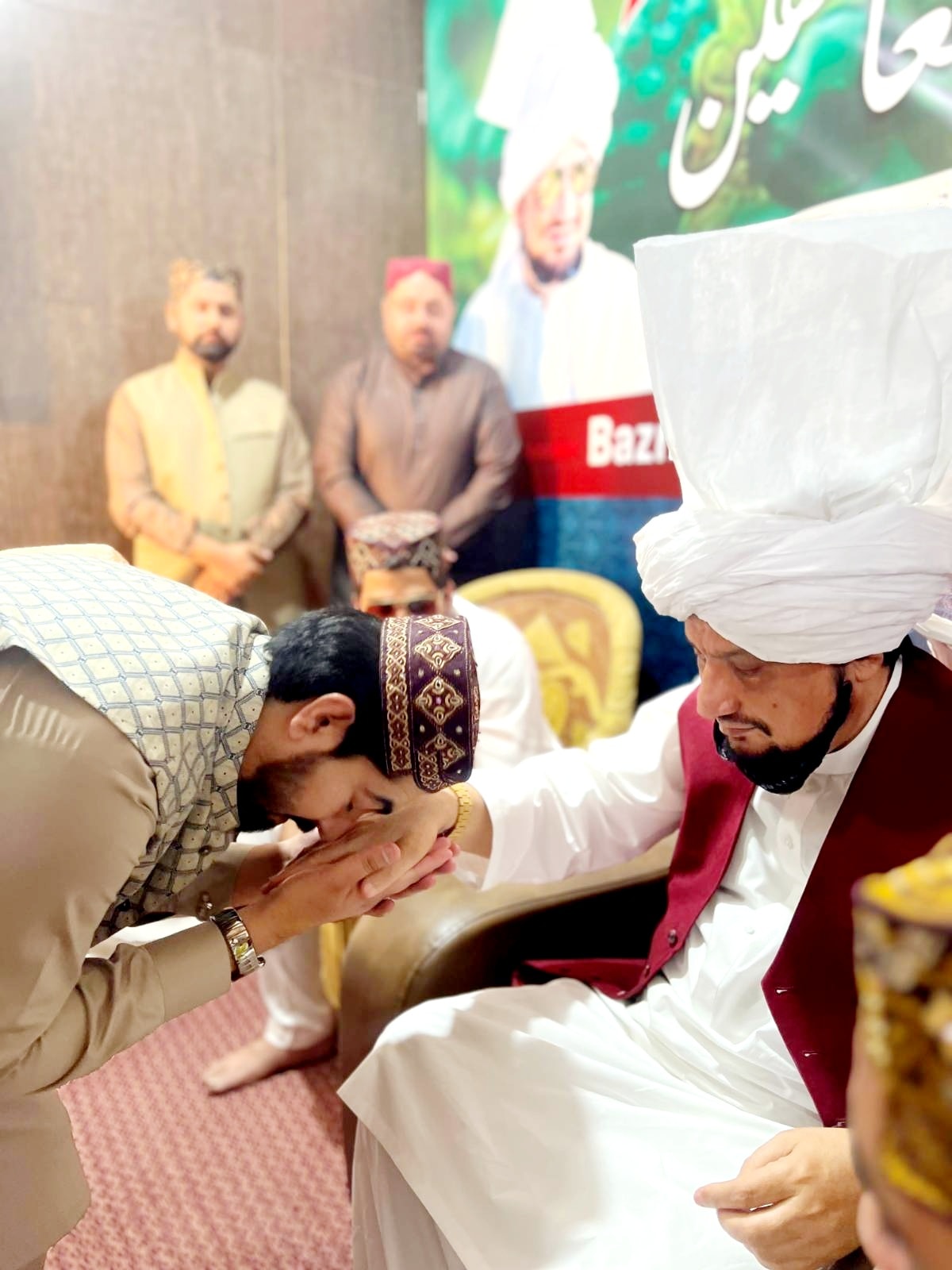This world is an examination hall. With its adornments and beautifications it constantly strays the man from his purpose of life which is to attain closeness and vision of the Divine Essence. The fear of losing wealth and life, and the love thereof, serves as a powerful weapon of the world and Satan, in which the man easily becomes entangled. This indeed is the greatest test for man in this life. Therefore, it is incumbent upon man to continuously strive for eternal success. Allah says in Quran.
(O believers!) You will most certainly be tested in your possessions and your selves. And of course you shall also hear many torturing (taunts) from those who were given the Book before you and who are polytheists. But if you remain patient and stick to self-protection, that is one of the works demanding high resolve. (3: 186)
At another place Allah said:
(It is that) you have (perfect) belief in Allah and His Messenger (pbuh) and strive hard for the cause of Allah with your human and material resources. That is better for you if you know.
Meaning and Concept of Sadaqah
Sadaqah is a form of financial jihad in the way of Allah. It is spending one’s wealth towards upholding Islam for the sake of Allah’s pleasure, and to invite people towards the path of truth.
Imam Raghib Isfahani writes:
Sadaqah is that wealth which giving is not obligatory, rather the giver intends to attain closeness to Allah through giving. (Zakat and Sadaqat)
Sadaqah is derived from truthfulness and sincerity because giving Sadaqah involves spending wealth for the pleasure of Allah, thus it is evidence of the sincerity and truthfulness of the giver’s faith.
Virtues of Sadaqah in the Light of Quran and Hadith
Allah Almighty has promised immense rewards for those who give Sadaqah. Allah says in the Quran:
The example of those who spend their wealth in the way of Allah is like (that) grain out of which seven ears shoot forth. (And then) each ear bears a hundred grains (i.e., they are rewarded seven hundred times). Allah multiplies (still more) for whom He likes. And Allah is Infinite, All-Knowing. (2: 261)
And those who spend their wealth to seek Allah’s pleasure and stabilise themselves (in faith and obedience) are like a garden located on a higher ground level. When a heavy rain falls on it, it doubles its yield. And if it does not receive a heavy rain, then even dew (or drizzle) is sufficient. And Allah monitors your actions minutely. (2: 265)
Rafi’ bin Khadij narrated a Hadith of Prophet Mohammad (pbuh) as follows:
Sadaqah closes seventy doors of evil and misfortune. (Tabarani 4402)
Sadaqah extinguishes sins as water extinguishes fire. (Tirmidhi 2616)
Sadaqah does not decrease wealth
Abu Huraira (RA) narrated that the Holy Prophet said, “No one ever decreases his wealth by giving Sadaqah. And Allah increases the honour of a servant who forgives, and no one humbles himself for the sake of Allah except that Allah raises his status.” (Sahih Muslim 6592)
Another hadith states: “Sadaqah increases the lifespan, prevents a bad death, and eliminates arrogance and pride before Allah.” (Tabarani)
The advice of Luqman the Wise to his son was: “O my son! Whenever you commit a sin, give Sadaqah.” (Kimiya-e-Saadat)
Therefore, giving Sadaqah with sincere intentions for purification of the soul and closeness to Allah is highly commendable in the court of Allah. Allah says in the Quran:
Surely, both the men and the women who give charity and those who lend a goodly loan to Allah, (the reward of charity) will be increased for them manifold, and there will be most honourable reward for them. (57: 18)
Refusal to give Sadaqah and the Warning
Sadaqah serves as a means to ward off calamities, expel the love of wealth from the inward, and leads to attaining closeness to Allah. Refusal to give Sadaqah angers and displeases Allah Almighty.
As Allah says in the Quran:
O believers! Spend (in the cause of Allah) out of whatever We have provided for you, before the Day comes when there will be no trading; and (for disbelievers) neither any friendship (will be useful) nor (any) intercession; and it is the disbelievers who are the transgressors. (2: 254)
And spend (in the way of Allah) out of (the wealth) which We have given you before death approaches one of you, and he says: ‘O my Lord, why did You not give me respite for a short while so that I could donate in charity and become one of the most pious? (63: 10)
Etiquette of Sadaqah
Sadaqah given with sincerity of intention becomes a means to cleanse the inward from spiritual diseases. Therefore, it is essential for the inward to turn purely towards Allah at the time of giving Sadaqah, only then one can achieve the essence of Sadaqah. Because giving Sadaqah with ostentation, show, and pretence leads to destruction and ruin.
Allah says in the Quran:
O believers! Do not ruin your charity donations (later) by taunts of doing favour and hurting feelings like the one who gives charity to show off his wealth to the people and believes in neither Allah nor the Last Day. His case is like a smooth rock covered with a thin coat of soil. Then heavy rain falls on it, washes it clean and leaves it (the same) bare and hard (rock). So these (pretentious people) shall get nothing out of their earning. (2: 264)
Abu Huraira (RA) narrated a lengthy hadith in which it is mentioned that among the first three persons who will be thrown into Hell, one will be a generous but pretentious person who used to give Sadaqah and charity for show.
Ostentation Ruins Sadaqah
The Holy Prophet said: “On the Day of Judgment, a person upon whom Allah had bestowed abundant wealth of all kinds will be brought forward. Allah Almighty will make him recognise His blessings, and he will acknowledge them. Allah will then ask him: ‘What did you do with these?’ He will reply: ‘I did not leave any path in which You like spending wealth but I spent in it.’ Allah will say: ‘You lie. You did it so that it may be said: he is generous.’ So, it will be commanded regarding him, and he will be dragged along on his face and cast into the Fire.” (Sahih Muslim, 4923)
Therefore, if a person publicly gives charity and donations but his intention is not to seek Allah’s pleasure but to attain worldly prestige, honour, and status, such charity, involving both inner and outward deeds, is erased and recorded in the ledger of ostentation. Because a stingy person does not spend wealth in the way of Allah with a joyful heart. However, during the act of giving Sadaqah, if ostentation starts to emerge in his heart, the stingy person cannot save himself from it, and even while practicing ostentation, he indeed spends his wealth in the way of Allah, but such action brings no benefit to him; instead, it leads to destruction.
Imam Ghazali’ Views
Imam Ghazali said: “If stinginess is compared to a scorpion, then ostentation is like a snake, which is more powerful than a scorpion. If a scorpion is killed and fed to the snake, the snake will become even more poisonous and dangerous. Hence, public and outward giving of Sadaqah may result in greater harm than benefit.” (Kimya-e-Saadat)
In the etiquette of giving Sadaqah, it is also essential never to delay it because Sadaqah is a favoured act in the court of Allah, so the self and Satan try to create excuses for delaying its payment.
A pious man went to the restroom and the thought occurred to him: Why don’t I give my cloak to a needy? As soon as this thought came to his mind, he called out to one of his disciples there and handed him the cloak. The disciple asked, “Master! Why didn’t you give it to him yourself when you went outside? What was the harm?” The sage replied: “For fear that another thought might enter my heart and I would be deprived of this good deed!” (Kimya-e-Saadat)
Types of Sadaqah
Sadaqah has two forms: obligatory Sadaqah and voluntary Sadaqah. Obligatory Sadaqah includes Zakat, Sadaqah al-Fitr and Kaffara. On the other hand, voluntary Sadaqah includes general acts of kindness, voluntary donations, and gifts.
The fulfilment of obligatory Sadaqah, such as Zakat and Sadaqah al-Fitr, has specific conditions, such as reaching the prescribed threshold and completing the designated period, etc. The payment of obligatory Sadaqah is necessary, and failure to pay them constitutes a sin. However, there are no conditions for the payment of voluntary Sadaqah, meaning there is no prescribed threshold or time limit for its payment.
Prophet Mohammad (pbuh) said: “Every Muslim must give charity.” People asked, “O Messenger of Allah, what if someone does not have anything?” He said, “Then let him work with his hands and benefit himself and also give in charity.” People asked again, “What if he is unable to work or do anything?” He said, “Then he should assist the needy who ask for help.” They asked, “What if he is unable to do even that?” He said, “Then he should do good deeds and keep away from evil deeds, and this will be regarded as charity.” (Sahih Muslim, 2333)
Another Hadith says: “Your smile for your brother is charity. Your command to do good and your prevention of evil are charity. Guiding a person in a place where he will not go astray is charity. Guiding the blind and removing obstacles from the path are charity. Pouring water from your jug into the jug of your brother is charity.” (Tirmidhi, 1956)
The True Recipients of Sadaqah?
Sadaqah is given solely for the sake of Allah’s pleasure. After understanding this, it is also necessary to know who the real recipients are. Generally, it is believed that Sadaqah should be given to the beggars and the destitute. However, this is entirely wrong, as it is highly discouraged to beg in the name of Allah. These people, turning away from Allah’s command of “trust upon Allah,” are blinded by worldly desires, obsessed with wealth and worldly possessions, and busy accumulating worldly gains. Thus, by disobeying Allah’s commands, they become accursed in the sight of Allah. Therefore, giving Sadaqah to such people is essentially wasting money. On the other hand, encouraging such despicable behaviour is also not correct.
Abdullah bin Umar (RA) narrated a Hadith of Prophet Mohammad as follows: “A person keeps on asking others for something until he comes on the Day of Resurrection without any piece of flesh on his face.” (Sahih Muslim, 2398) (Zakat o Sadaqat)
Samurah bin Jundab narrated a Hadith: “Begging is a wound that a person inflicts upon his face, except if one asks for help from a ruler or for a genuine need.” (Musnad Ahmad bin Hanbal, 20366)
Perfect Fakirs are the Rightful Recipients of Sadaqah
Zakat, Sadaqah al-Fitr, Sadaqah, and other charitable donations are designated for specific recipients. Allah has clearly outlined this in the Holy Quran:
Indeed, alms (Zakat) are meant for the Fakirs and the indigent, and those who are deployed to collect charities and those in whose hearts the inculcation of love for Islam is aimed at. And, (moreover, spending Zakat for the) freeing of human lives (from the yoke of slavery) and removing the burden of those who are to pay debt and (those who toil hard) in the cause of Allah and the wayfarers (is true). This (all) has been prescribed by Allah, and Allah is All-Knowing, Most Wise. (9: 60)
According to this directive, the foremost recipients of charitable donations are the perfect Fakirs (Saints). It is crucial to understand that generally, beggars and wanderers are mistakenly labelled as Fakirs. The previous text has already discussed beggars and wanderers, while “Fuqara” is the plural of “Fakir,” referring to those who have devoted their lives to Allah’s cause and do not engage in worldly pursuits. As elucidated in Surah Al-Baqarah, they are those:
(Charity is) the right of those who have been restricted (from earning their livelihood) in the cause of Allah. They cannot even move about in the land (due to their whole time involvement in matters of Din [Religion]). Because of their (ascetic) aversion to greed, the unwise (knowing little about their state of inward) consider them wealthy. You will recognise them from their appearance. They do not ask people (for help) at all lest they should humble themselves (before them). And whatever wealth you give in charity, Allah indeed knows it well. (2: 273)
Dialogue of Shaikh Abdul Qadir Jilani with Allah
Shaikh Abdul Qadir Jilani (RA) said: Allah Almighty said to me: “Near Me, the Fakir is not the one who possesses nothing, rather the Fakir is the one whose command is implemented over everything, and when he says ‘Be,’ it becomes.” (Al-Risalah Al-Ghousiyyah)
Prophet Mohammad said: “Serve the Fakir with your wealth and assets before your wealth perishes.” (Muhkam Al-Fuqara)
Abu Dhar (RA) narrated: He asked the Messenger of Allah about various matters, one of which was about charity. He said: “O Messenger of Allah! Which charity is the best?” The Holy Prophet replied: “Giving charity to a Fakir in a concealed manner or giving charity for the hard work of a person with modest means is the best charity.” (Musnad Ahmad, 21885)
The one who presents Sadaqah and Zakat to the Fakir is never afflicted with poverty and distress.
A Scholar in the time of Junaid of Baghdad
It is said that during the time of Junaid of Baghdad (RA), there was a scholar who was also vegetable vendor. His practice was that when giving charity, he prioritised the Fakirs over others. When he was advised to also consider others in his charity, he replied, “These (Fakirs) are the people whose attention is solely towards Allah Almighty. If they are afflicted with poverty, their attention will be diverted. If I redirect someone’s attention towards Allah, then for me, it is more preferable than giving that person a thousand dirhams, whose only purpose is the world.”
When this matter was mentioned in front of Junaid of Baghdad (RA), he said, “He is one of the Saints of Allah and I have not heard anything better than this.” Gradually, his circumstances began to change, and he became bankrupt, intending to leave his shop. When Junaid of Baghdad (RA) learned of his delicate situation, he sent him a considerable amount of money and said, “Make this your capital and do not leave the shop because trade does not cause loss to people like you.” (Meaning, although you may face challenges in worldly trade, eternal trade will prove beneficial for you.)” (Mukashifat al-Quloob)
Sadaqah during Ramadan
Undoubtedly, giving charity and doing good deeds brings countless rewards in both this world and the hereafter. In the blessed month of Ramadan, along with acts of worship, the eagerness to give charity and do good deeds also increases because in this month, the reward for every good deed is multiplied seventy times.
Anas bin Malik (RA) narrates that someone asked the Messenger of Allah, ‘Which charity is the best?’ The Holy Prophet replied, ‘Giving charity in Ramadan is the best.’ (Sunan Tirmidhi, Hadith 663)
The Holy Prophet advised that no one’s wealth has benefited me as much as the wealth of Abu Bakr Siddiq (RA) did. The companions (RA) spent their wealth abundantly in the path of Allah, and eagerly waited for the command of the Holy Prophet so they could present their wealth in his court and attain success. Gawth al-Azam Shaikh Abdul Qadir Jilani (RA) said, ‘There is no Prophet among you now to follow. When you follow the followers (Perfect Fakirs or Saints), who are truly following Prophet Mohammad and firmly established in following, then indeed you have followed the Holy Prophet. When you visit them, indeed you have visited the Holy Prophet.’ (Al-Fath al-Rabbani, Majlis 14)
Sultan-ul-Ashiqeen
In the present era, the blessed personality of the Sultan-ul-Ashiqeen Sultan Mohammad Najib-ur-Rehman is a source of blessings. He devoted his entire life and abilities to call the mankind towards the Truth by Divine command. His disciples bear witness that he never found respite from fulfilling the affairs of the propagation of the Mohammadan Faqr even for a moment.
Here is a quote from the book “Sultan-ul-Ashiqeen:
Sultan-ul-Ashiqeen has revived the soul of Islam. His teachings proved to be a lighthouse of guidance for the umma of Prophet Muhammad in the form of 24 books. His presence is evidence that Allah Almighty still sends perfect Saints into the world for the welfare of His creation. Sultan-ul-Ashiqeen enlightened the inwards of countless people with Divine gnosis and showed the path of human ascension because reaching there is the true Sunna of Prophet Mohammad (pbuh). (Shan Sultan-ul-Ashiqeen)
Tehreek Dawat-e-Faqr
To systematically disseminate the message of Divine Truth to the seekers of truth, he established Tehreek Dawat-e-Faqr on October 23, 2009. The message of this movement is “ فَفِرُّوْٓا اِلَی اللّٰہِ “, “Run towards Allah”. Under the umbrella of this movement, various departments such as Sultan-ul-Faqr Publications, Monthly Sultan-ul-Faqr Lahore, Web Development Department, Social Media Department, Preaching and Inviting Department, Information and Publications Department, and several other departments were established. All these departments remain actively engaged day and night in the propagation of true Islamic teachings.
Allah says in the Quran:
And those who strive hard (and struggle against the inciting self vehemently) for Our cause, We certainly guide them to Our ways, and verily Allah blesses the men of spiritual excellence with His companionship. (29: 69)
Spiritual Guide is Like a Candle
A perfect spiritual guide is like a candle, and the Divine seekers are like moths drawn towards it. Sultan-ul-Ashiqeen is also like a candle for the Divine seekers. That’s why the number of his disciples is increasing day by day. Keeping this need in mind, he announced the construction of Masjid-e-Zahra and Khanqah Sultan-ul-Ashiqeen on December 1, 2017 (12 Rabi’ al-Awwal 1439 AH), on the blessed occasion of Eid Milad-un-Nabi.
Abu Huraira (RA) narrated a Hadith of Prophet Mohammad (pbuh) as follows:
Among the good deeds that reach a believer after death are the following: knowledge that he taught and spread, righteous offspring who pray for him, a copy of the Quran that he leaves as inheritance, a mosque that he built, a guesthouse that he constructed for travellers, a canal that he dug, or Sadaqah that he gave from his wealth while he was in good health. The reward for all these continues to reach him after his death.” (Sunan Ibn Majah, 242)
The purpose of constructing Masjid-e-Zahra and Khanqah Sultan-ul-Ashiqeen is to establish a centre for the propagation of the Muhammadan Faqr, where the Muslim community can be gathered for moral and spiritual reform. Undoubtedly, spending money in the blessed month of Ramadan to attain the pleasure of Allah holds great importance and reward.
I earnestly appeal to you to present your contributions and charities in the court of Sultan-ul-Ashiqeen, the Perfect Fakir, for the construction and expansion of Khanqah Sultan-ul-Ashiqeen or for the other departments of the Tehreek Dawat-e-Faqr, so that you may attain the blessings of Allah Almighty. Surely, Allah does not forget those who spend in the way of the Perfect Fakir in both worlds.
Books Consulted:
- Shan Sultan al-Ashiqeen by Sultan Muhammad Abdullah Iqbal Sarwari Qadri
- Kimiya-e-Saadat by Imam al-Ghazali
- Mukashifat al-Quloob by Imam al-Ghazali
- Zakat Aur Sadaqah by Dr. Tahir al-Qadri
What is Sadaqah?
Sadaqah is giving in the way of Allah. It is spending one’s wealth for the sake of Allah’s pleasure, and to invite people towards the path of truth.
Sadaqah has two forms: obligatory Sadaqah and voluntary Sadaqah. Obligatory Sadaqah includes Zakat, Sadaqah al-Fitr and Kaffara. On the other hand, voluntary Sadaqah includes general acts of kindness, voluntary donations, and gifts.
The fulfilment of obligatory Sadaqah, such as Zakat and Sadaqah al-Fitr, has specific conditions, such as reaching the prescribed threshold and completing the designated period, etc. The payment of obligatory Sadaqah is necessary, and failure to pay them constitutes a sin. However, there are no conditions for the payment of voluntary Sadaqah, meaning there is no prescribed threshold or time limit for its payment.




